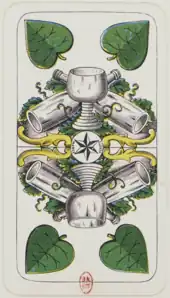Daus
See also: daus
German

Ein Daus von Grün
Etymology
From Middle High German dūs, from Old High German dūs, from Old French dous (“two”). Applied on a person possibly the same word, being most frequent in the interjection “Ei der Daus!”, stemming from the deuce, the highest card, being played, and hence having an ambiguous sense depending on the angle of view; however descendants of Latin deus (“god”) or dusius (“a kind of Gaulish demon”) might be in the game.
Pronunciation
- IPA(key): /daʊ̯s/
Audio (file)
Noun
Daus n (strong, genitive Dauses, plural Däuser)
- deuce, the number two in German games
- 1815 June 10, Intelligenzblatt der Neuen Jugend-Zeitung, number 8, page 2:
- Das Daus von Eckern zeigt den Barden unter der Eiche, wie die Germanen, ihn anlauschend, Wort und Klang vernehmen. – Das Daus von Herzen hat ein Tournier und die Preisvertheilung für Ritter und Sänger. – Das Daus in Schellen schildert eine neumodige Gasterei mit einem Vorschreier. – Das Daus in Grün hat einen Familienzirkel, wo die jungen Leute des Hauses durch Musik erfreuen. Dies sind die Festlichkeiten, die übrigen Karten dringen in die Häuslichkeit. […]
- The acorns deuce shows a bard under an oak, like the Germans, listening to him, hearken word and sound. – The deuce of hearts has a tourney for knights and singers. – The deuce of bells depicts a fashionable feast with a crier. – The deuce in green has a family circle where the young people of the house delight through music. These are the festivities, the remaining cards thring towards domestic matters.
Declension
Noun
Declension
Further reading
- “Daus” in Digitales Wörterbuch der deutschen Sprache
- “Daus” in Deutsches Wörterbuch von Jacob und Wilhelm Grimm, 16 vols., Leipzig 1854–1961.
- “Daus” in Duden online
This article is issued from Wiktionary. The text is licensed under Creative Commons - Attribution - Sharealike. Additional terms may apply for the media files.